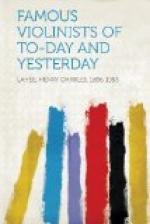Among the celebrated musicians of all nations, Ole Bull will always remain a striking figure. As a musician, none so eminent has been so essentially a self-made man, none has grown up with so little influence from outside, none with a technique so essentially self-discovered. As a son of his country, none has retained so sturdy a sense of patriotism; none has, amid the more brilliant surroundings of a life spent in the gayest cities of the world, refused to be weaned from the poor northern, half-dependent state from which he issued a penniless lad.
Olaus Borneman Bull was born at Bergen, in Norway, February 5, 1810, and was the eldest of ten children. His father was a physician and apothecary. He was musical, as were several other members of his family, and little Ole’s love for music was fostered to a great degree at home by the Tuesday quartet meetings, at which his Uncle Jens played the ’cello.
In the early part of the century, the proverb, “Spare the rod and spoil the child,” was regarded as the foundation of education in most countries, and few children were allowed to spoil. All childish desires which conflicted with parental ideas were promptly suppressed by “the rod,” until by sheer strength they proved to be unsuppressible. Then they became great virtues. It was thus with Ole Bull. His first desire to hear the quartet music, which he gratified by hiding under sofas or behind curtains, was rewarded with the rod,—for he should have been in bed. After a time a concession was made through the intervention of Uncle Jens, and Ole was allowed to become familiar with the best music of the day.
Uncle Jens used to amuse himself with the small boy’s susceptibility to music, and would sometimes shut him up in the ’cello case, promising him some candy if he would stay there while he (Uncle Jens) played. But Ole could never endure the ordeal for long. He had to come out where he could see and hear.
His first violin was given him by Uncle Jens when he was five years old, and he soon learned to play it well without any instructor. He was not allowed to practise music until his study hours were over, and occasional breaches of this rule kept “the rod” active.
Ole Bull’s first instructor was a violinist named Paulsen, a man of convivial temperament, who used to come and enjoy the hospitality of Ole’s father and play “as long as there was a drop in the decanter,” with a view to educating the young artist, as he said. But Ole’s parents were thinking of prohibiting the violin altogether on the plea that it interfered too much with his studies, when the tide of affairs was changed by the following incident.
One Tuesday evening, Paulsen, who played first violin in the quartet, had been so convivial that he was unable to continue. In this unfortunate dilemma Uncle Jens called upon Ole, saying, “Come, my boy, do your best, and you shall have a stick of candy.” Ole quickly accepted the challenge, and as the quartet was one which he had several times heard, he played each movement correctly, much to the astonishment of all present.




